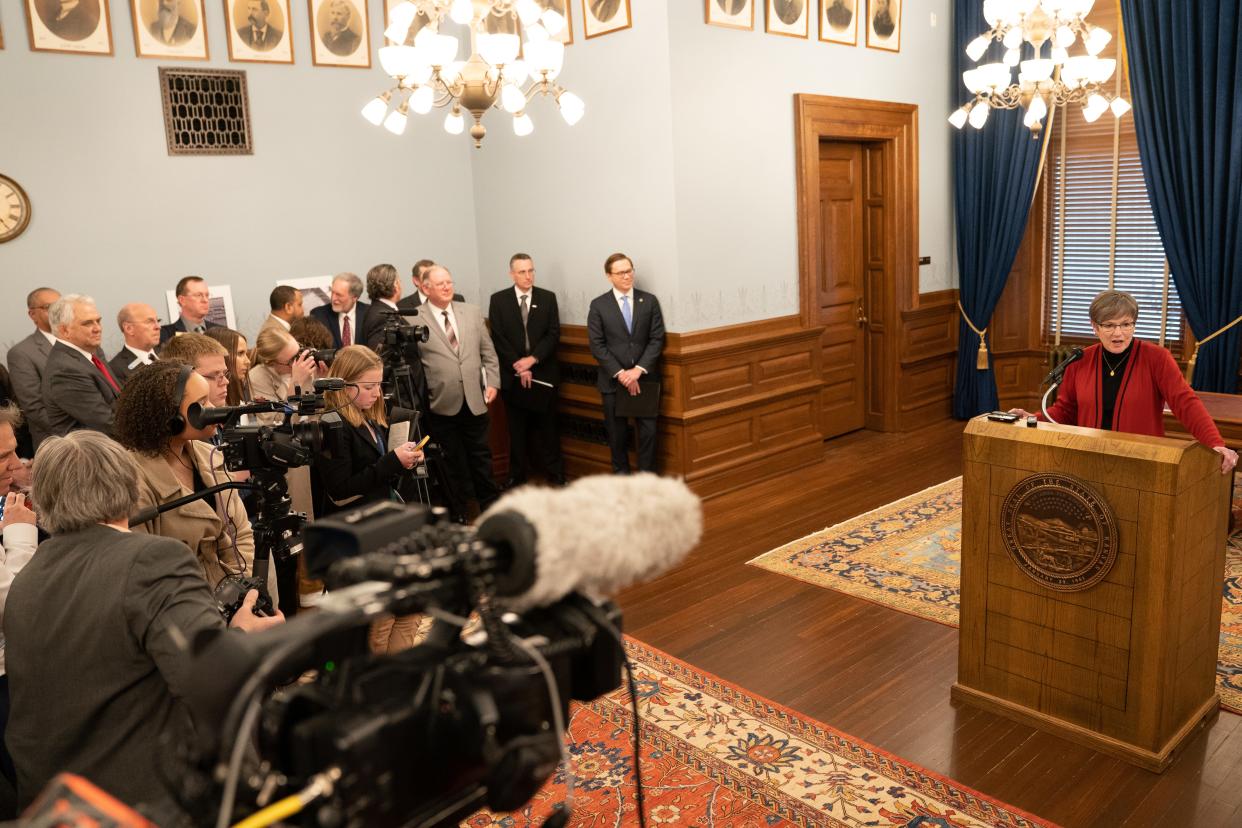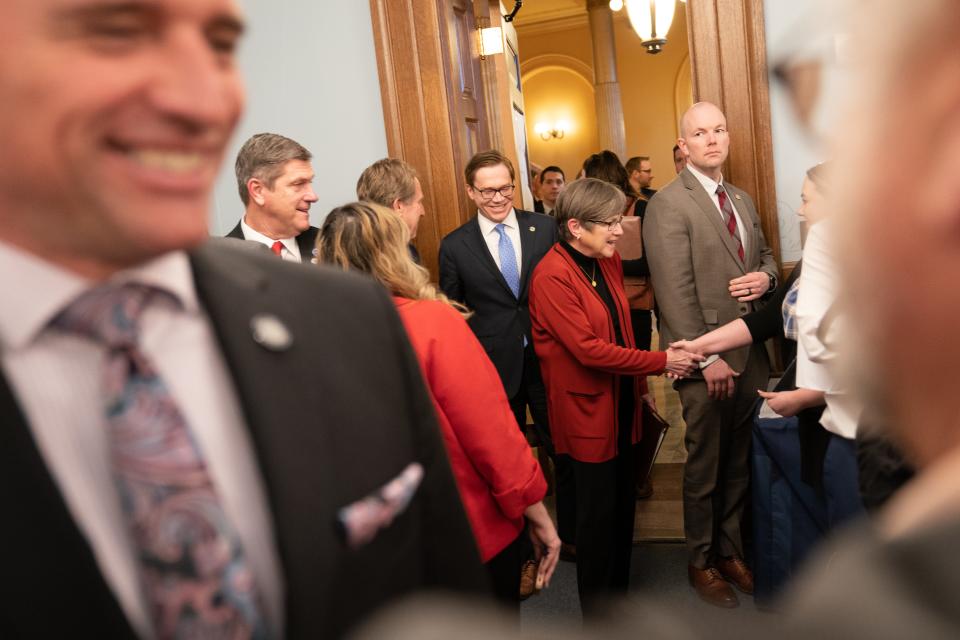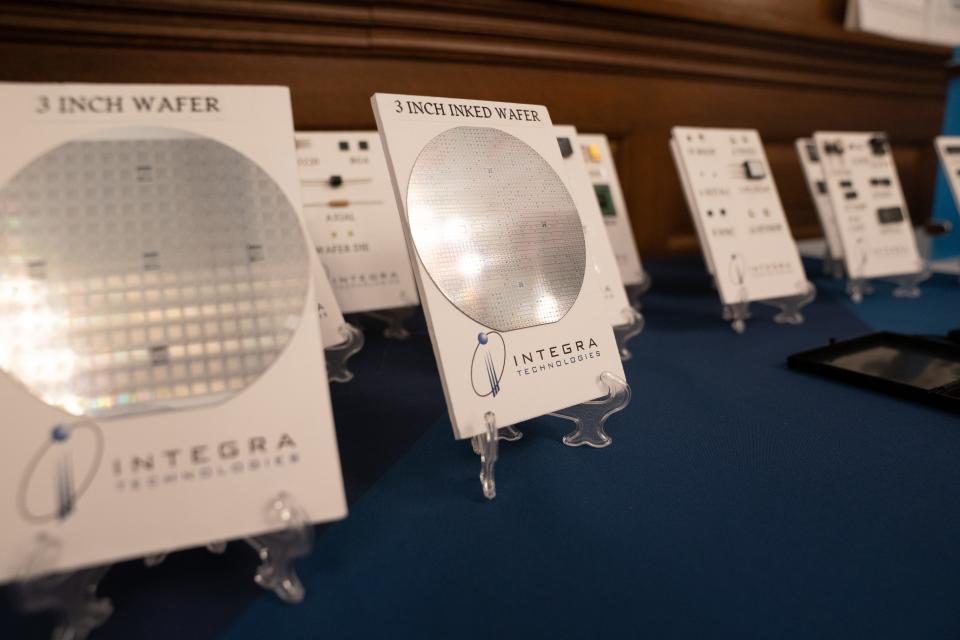First, it was Panasonic and now Integra. Are tax-driven megaprojects good for Kansas?

- Oops!Something went wrong.Please try again later.
In October, politicians crowded around a dirt field in DeSoto to cheer the economic development project of their dreams: a Panasonic electric vehicle battery plant in the Johnson County community.
But all the while, officials were working to secure what they view as the next big thing: using $304 million in state dollars to support Integra Technologies' construction of a $1.8 billion semiconductor plant in the Wichita area, a move officials claim will create 1,994 new jobs in the company.
Gov. Laura Kelly and Lt. Gov. David Toland, who also serves as commerce secretary, have argued the project is another gamechanger for the state's economy.
"Panasonic did not represent the end of our economic development efforts — far from it," Kelly said at a Statehouse news conference. "We were just getting started. And today is proof."
But many of the same criticisms leveled against the Panasonic deal — and diverting state monies to economic development projects more broadly — remain, while some question the wisdom of using the incentive framework on a company already based in Kansas.
They are compounded by significant uncertainty regarding the CHIPS Act, the federal law passed last year to stimulate investment in the semiconductor industry domestically.
Kansas will need to be awarded federal incentives for the Integra project, otherwise the state can withdraw their offer and look for another megaproject.
All the while, a land rush has occurred nationally with states trying to get into the semiconductor space. But some worry Kansas could be prospecting for fool's gold as much as the real thing.
"I think it'll have the appearance of being good. It'll be good for some people and, hopefully, it depends on the deal that's cut," said Rep. Henry Helgerson, D-Wichita. "Sometimes governments give too much away in the process, and we still don't know everything we gave away in the last one."
More:Panasonic breaks ground on 'transformative' electric vehicle battery plant in Kansas
Integra is second APEX megaproject, but transparency concerns remain
Integra would be the second megaproject to take advantage of a 2022 law, the Attracting Powerful Economic Expansion program, that offers unprecedented levels of state incentives for projects where the total capital investment tops $1 billion.
But the bill allowed lawmakers to approve a megaproject not just in 2022 but in 2023 as well, opening the door to rampant speculation that another major initiative would be on the way. The Department of Commerce said it was kicking the tires on as many as nine potential projects.
"The wisdom is the opportunity for growth," said Senate President Ty Masterson, R-Andoverf. "The enabling legislation allowed for two years, basically two projects. That decision was made before even Panasonic was announced that we would be willing to take on two projects, so this is just the second half of that. And then I think you will see a pause to see what the real effect is."

Kansas' foray into the semiconductor world is not a surprise either.
Department of Commerce officials told lawmakers last month that they were targeting megaprojects in the semiconductor and microchip industries, a move designed to take advantage of the federal CHIPS and Science Act, passed in 2022.
The law, signed by President Joe Biden in August, includes $200 billion in research and development of microchips, semiconductors and related industries, as well as workforce and economic development incentives to expand American production.
Without the CHIPS Act funding, Integra CEO Brett Robinson said, the expansion couldn't take place. He also said the company was in discussions with other states prior to reaching an agreement with Kansas officials on incentives.
Kelly and Toland, who spent much of their reelection campaign touting economic development, said keeping a Kansas company in the state was a wise use of the incentive dollars.
"We're taking an approach that reflects both of those philosophies with Panasonic last year, recruited from outside," Toland said. "And Integra, which is an existing long-standing Kansas company that wishes to grow here, but which was also has been wooed aggressively by other states that would like very much for them to move, and we wanted to make sure that didn't happen."
Per the terms of the agreement, Integra must employ at least 1,600 full-time workers each year for a decade or risk being forced to repay a proportionate amount of the state incentives.
And if $1.5 billion is not invested within five years, officials said, all benefits must be paid back to the state.
More:Provision in Panasonic deal may make details on Kansas megaprojects exempt from open records law
Under the APEX law, the state can choose to exempt the contract details between the Department of Commerce and Integra, though the agency voluntarily provided both the Panasonic and Integra agreements to the Capital-Journal and other media outlets.
But much like the Panasonic deal, officials were forced to sign a nondisclosure agreement in order to be informed about the contents of the project.
And public debate around the Panasonic deal occurred because legislators were considering whether to pass the new incentive framework — something which didn't need to occur this time around. All that was required is approval from the State Finance Council, a panel comprised of Kelly and legislative leadership.
The council approved the incentive package Thursday afternoon in a closed-door meeting, despite a request from the media for the deliberations to be open to the public.
Rep. Troy Waymaster, R-Bunker Hill, chair of the House Appropriations Committee, argued the public had input on the deal because it was acknowledged as a possibility when legislators passed the original APEX bill.
"I would argue there is nothing that is being non-transparent, because it was passed last year," he told reporters.

The pool of lawmakers who signed nondisclosure agreements this time is believed to be smaller than for the Panasonic project.
Rep. Sean Tarwater, R-Stilwell, chair of the House Commerce Committee, said he was unaware of the project and many Wichita-area lawmakers said they also had been kept in the dark.
Rep. Tom Sawyer, D-Wichita, groaned when a Capital-Journal reporter informed him that the planned economic development announcement was a second megaproject.
"Oh God, I guess I have to support it — probably," he said with a chuckle.
But Sawyer, who voiced his support for the bill on the floor of the Kansas House as the Democratic floor leader in 2022, added a note of caution as well.
"I get worried if we do too many of these," he said. "If I'm another business, I'm not sure why I would ever want to expand in Kansas unless I got a megaproject. You start creating this (business environment) where the only way we can get these is we have to give away everything. To me, it's a slippery slope, and you have to be a little bit careful."
More:In wake of Panasonic deal, Kansas targets potential microchip manufacturers for megaprojects
Kansas set to invest in microchip industry amid struggles
Semiconductor and microchip investment is cropping up nationally in the wake of the CHIPS Act, as states and domestic manufacturers rush to get in on the potential federal subsidies.
The stated goal of the legislation at the time was to bring the industries back to the United States to avoid supply chain snafus that dogged the country in the wake of the COVID-19 pandemic. Other countries, such as China or South Korea, already bankrolled their own domestic industries, proponents argued.
"We saw the recent risks of not having chip manufacturing in the United States to our national security and economy with the pandemic," Robinson said.

Chipmaker Micron Technologies announced they would use CHIPS Act dollars to build a $20 billion factory in upstate New York, an incentive package that also included over $5 billion in state support.
Prior to the passage of the CHIPS Act, Intel announced they would build a $20 billion plant in New Albany, Ohio, with state inducements topping $1.1 billion in Gov. Mike DeWine's latest budget request.
Speaking with lawmakers, deputy secretary of commerce Paul Hughes offered limited details about what the grant money available under the CHIPS Act might look like.
Applications would be submitted in February, with the federal government rendering a decision in July — an unusually tight timeframe, he noted. State and local incentives are required to unlock the federal funding.
But other details are largely unknown and it is uncertain when the U.S. Department of Commerce will make them public. It is unclear whether all eligible projects who apply will get funds or if some could be stuck without any federal help — which could leave the Integra project high and dry for state support as well.
"Uncharted territory is a bit of an understatement," said Nathan Jensen, a professor of government at the University of Texas-Austin, who researches economic development. "It hasn't even been written how it (CHIPS Act regulations) is going to work exactly."
The Semiconductor Industry Association has been quick to tout $200 billion in investment it claims has been spurred on by the CHIPS Act, with 40 projects announced across 16 states.
Yet experts for months have reported a glut of microchips after weathering the shortage, and the oversupply was expected to hurt the semiconductor industry.
Chipmaker Intel reported poor fourth-quarter earnings — a net loss of $664 million — resulting in cutting pay and other compensation for executives and rank-and-file employees alike.
Intel CEO Pat Gelsinger referred to it as "short-term challenges." Dave Zinsner, Intel's CFO, said there remains an "opportunity for strong revenue growth."
Kansas has the money, but is another megaproject the best use?
The second megaproject puts Kansas businesses in line for a half-percent income tax cut, per the terms of the APEX legislation.
But lawmakers have floated much broader tax cuts.
The projected budget surplus, not accounting for proposed tax cuts or spending changes, in the current fiscal year is $2.3 billion and $3.2 billion for the next year, numbers which have led to calls for cutting taxes on retirement income and even establishing a flat income tax.
Waymaster said there might now be limits to how much money lawmakers were hoping to put in the state's rainy day fund but didn't expect major changes to the budget.
"It is not going to have a dire effect on the budget," he said.
Sen. Caryn Tyson, R-Parker, who is chair of the Senate tax committee, said the APEX tax cut "helps, and it's a good move to lower taxes for everyone." However, she doesn't like that "APEX picks one winner over the rest of the corporations and companies."
"Think about that income tax money that's being used for the one company," Tyson said. "If we could lower that for all businesses and individuals in Kansas, that would be a win for the state."
More:At $1.5 billion, Kansas Chamber's flat tax plan would be bigger tax cut than Brownback's
The project's announcement also comes as the Department of Commerce is seeking to extend the APEX program, which is currently set to end in 2024, among other tweaks.
Toland said the extension of APEX would allow Kansas "to make sure that we can take advantage of other megaprojects, which are in our pipeline."
Tarwater, the Stilwell representative, has said he is open to the idea but that he would like to see changes to the open records exemption, as well as a requirement that the state get guarantees from companies on the number of jobs created.
But he raised broader concerns about how the state will create enough jobs, not just to satisfy Panasonic and the new project but also smaller businesses.
More:Kansas' Panasonic plant aims to bring 4,000 jobs to De Soto. Where will the workers come from?
State and local agencies have stressed they are partnering with educational institutions in northeast Kansas to supply the Panasonic workforce and Tarwater said he was confident in those talks — but said the new development would put the state to the test.
"I just hope they come to fruition," he said. "Because a lot of times we think we can do something and then it doesn't work out like we think. And now we're going to add another however many thousands of jobs. ... Where are those people going to come from?"
Semiconductor plants can provide a steady stream of well-paying jobs, said government professor Jensen, but they "aren't transformative for most communities."
"It's capital-intensive manufacturing," he said. "So, what does that bring your community? It brings tax revenues, but if you're giving big tax abatements, you're literally giving back the exact benefit."
This article originally appeared on Topeka Capital-Journal: Kansas has Panasonic and Integra megaprojects from taxpayer incentives

